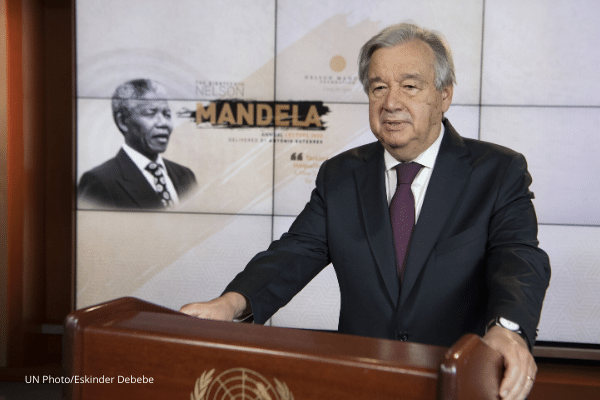By J. Tuyet Nguyen
New York – The United Nations was supposed to mark its 75th anniversary this year with an elaborate forward looking program for more achievements and a brighter future. But it found instead that the coronavirus pandemic has mostly gutted progress made in areas like living standards and has worsened social injustice.
The UN was established on June 26, 1945 when victorious World War II allies and scores of governments signed the UN Charter in San Francisco.
The pandemic has severely upended scheduled UN meetings, one of which is the important annual UN General Assembly session taking place in September. Under normal times in the past 74 years the sessions were attended scrupulously by presidents, ministers and leaders of international organizations at UN headquarters in New York, packing the assembly hall that can have 2,000 delegates.
But the UN has told presidents and prime ministers to stay home this year when the session opens on September 21st. Each of the 193 countries that are UN members can send only one or if possible two delegates rather than a delegation of more than a dozen officials. All meetings will be held virtually, with pre-recorded speeches aired in a mostly empty General Assembly. Attendees will have to wear facial masks and keep social distancing.
“We have been brought to our knees – by a microscopic virus,” UN Secretary General Antonio said in a speech delivered remotely on July 18 to the annual Nelson Mandela Lecture in Johannesburg, South Africa, which was titled “Tackling the inequality pandemic: A new social contract for a new era.”
“The pandemic has demonstrated the fragility of our world. It has laid bare risks we have ignored for decades: inadequate health systems; gaps in social protection; structural inequalities; environment degradation; the climate crisis.”
He said progress made in eradicating poverty and narrowing inequality have been set back years “in a matter of months,” warning that some 100 million more people could be pushed into extreme poverty because of the pandemic.
“The virus poses the greatest risk to the most vulnerable: those living in poverty, elder people and people with disabilities and pre-existing conditions,” he said, adding that coronavirus has shone the light on inequalities.
“Covid-19 has been likened to an X-ray, revealing fractures in the fragile skeleton of the societies we have built.”
“Because while we are all floating on the same sea, it’s clear that some are in super yachts while others are clinging to floating debris,” he said.
Latin America and the Caribbean
A policy brief on Latin America and the Caribbean issued by Guterres said the region has become a hotspot of the pandemic while it is torn with “profound inequalities” because of high levels of informal labor and fragmented health services. The brief said that the region will suffer a 9.1-percent contraction in gross domestic product (GDP), the largest in a century.
“The social impacts of pandemic will be felt acutely, with sharp rise in unemployment, poverty, extreme poverty and inequality,” it said.
The region, which has a total population of 230 million, will have more than 44 million unemployed people under the pandemic, 45 million people will live in poverty and 28 million in extreme poverty.
The brief said people disproportionately affected by the pandemic are indigenous and those of African descent because they live in “worse economic conditions and have limited access to social protection compared to the rest of the population, in addition to high levels of discrimination in the labour market.”
Pandemic disrupts 15-year UN Sustainable Development Goals
In another study issued in July the UN said its 15-year global efforts to improve the lives of people everywhere under the 17 Sustainable Development Goals (SDGs) were disrupted by the fast spreading coronavirus within a few months in the first part of 2020
The study said progress had been made to advance the goals even though it was not even and sufficient in areas such as improving maternal and child health, increasing women’s representation in government and access to electricity in developing countries.
“As Member States recognized at the SDG Summit held last September, global efforts to date have been insufficient to deliver the change we need, jeopardizing the agenda’s promise to current and future generations,” Guterres said. “Now, due to COVID-19, an unprecedented health, economic and social crisis is threatening lives and livelihoods, making the achievement of goals even more challenging.”
Other findings in the study said the over 1 billion people living in slums around the world are vulnerable to Covid-19 because of the lack of water, housing, shared toilets, crowded space and limited access to health care facilities.
It said women and children are among those suffering the most from the pandemic due to the disruption of health and vaccination services. School closure has kept 90 percent of the 1.57 billion students worldwide out of schools, causing millions of them to miss out school meals they depended on and health services provided schools.
Adopted in 2015, the SDGs targeted 17 goals to be achieved by 2030 with ending poverty at the top of the list. It is followed by hunger, maternal and child mortality, gender equality, clean water and sanitation, decent work, reduction of inequalities, sustainable cities and responsible consumption.

